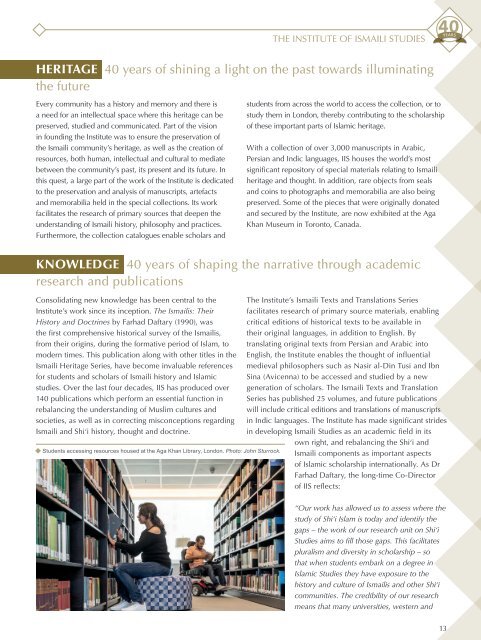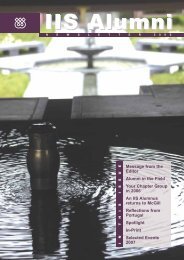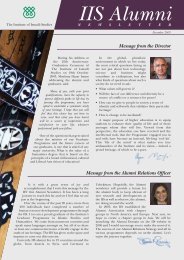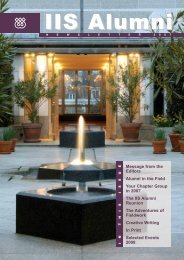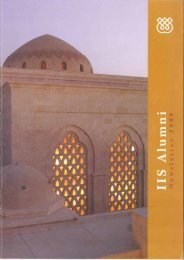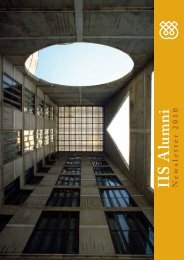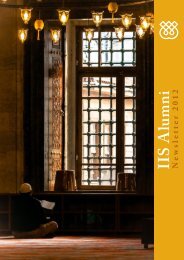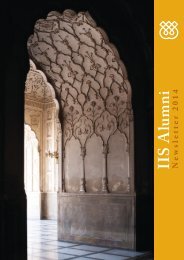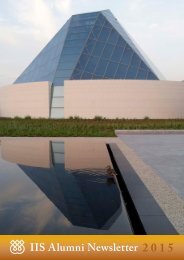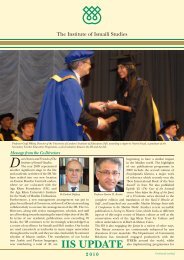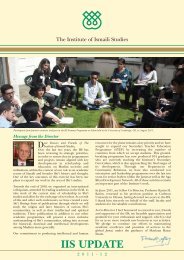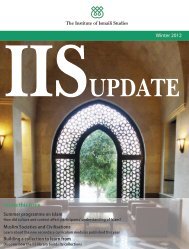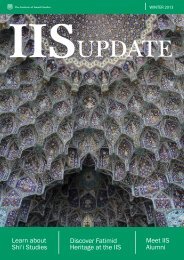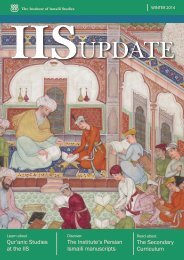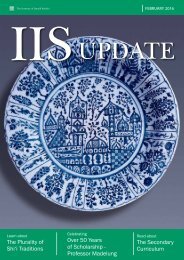IIS Update 2018
A special fortieth anniversary edition of IIS annual magazine.
A special fortieth anniversary edition of IIS annual magazine.
You also want an ePaper? Increase the reach of your titles
YUMPU automatically turns print PDFs into web optimized ePapers that Google loves.
THE INSTITUTE OF ISMAILI STUDIES<br />
40<br />
YEARS<br />
HERITAGE 40 years of shining a light on the past towards illuminating<br />
the future<br />
Every community has a history and memory and there is<br />
a need for an intellectual space where this heritage can be<br />
preserved, studied and communicated. Part of the vision<br />
in founding the Institute was to ensure the preservation of<br />
the Ismaili community’s heritage, as well as the creation of<br />
resources, both human, intellectual and cultural to mediate<br />
between the community’s past, its present and its future. In<br />
this quest, a large part of the work of the Institute is dedicated<br />
to the preservation and analysis of manuscripts, artefacts<br />
and memorabilia held in the special collections. Its work<br />
facilitates the research of primary sources that deepen the<br />
understanding of Ismaili history, philosophy and practices.<br />
Furthermore, the collection catalogues enable scholars and<br />
students from across the world to access the collection, or to<br />
study them in London, thereby contributing to the scholarship<br />
of these important parts of Islamic heritage.<br />
With a collection of over 3,000 manuscripts in Arabic,<br />
Persian and Indic languages, <strong>IIS</strong> houses the world’s most<br />
significant repository of special materials relating to Ismaili<br />
heritage and thought. In addition, rare objects from seals<br />
and coins to photographs and memorabilia are also being<br />
preserved. Some of the pieces that were originally donated<br />
and secured by the Institute, are now exhibited at the Aga<br />
Khan Museum in Toronto, Canada.<br />
KNOWLEDGE 40 years of shaping the narrative through academic<br />
research and publications<br />
Consolidating new knowledge has been central to the<br />
Institute’s work since its inception. The Ismailis: Their<br />
History and Doctrines by Farhad Daftary (1990), was<br />
the first comprehensive historical survey of the Ismailis,<br />
from their origins, during the formative period of Islam, to<br />
modern times. This publication along with other titles in the<br />
Ismaili Heritage Series, have become invaluable references<br />
for students and scholars of Ismaili history and Islamic<br />
studies. Over the last four decades, <strong>IIS</strong> has produced over<br />
140 publications which perform an essential function in<br />
rebalancing the understanding of Muslim cultures and<br />
societies, as well as in correcting misconceptions regarding<br />
Ismaili and Shi‘i history, thought and doctrine.<br />
Students accessing resources housed at the Aga Khan Library, London. <br />
The Institute’s Ismaili Texts and Translations Series<br />
facilitates research of primary source materials, enabling<br />
critical editions of historical texts to be available in<br />
their original languages, in addition to English. By<br />
translating original texts from Persian and Arabic into<br />
English, the Institute enables the thought of influential<br />
medieval philosophers such as Nasir al-Din Tusi and Ibn<br />
Sina (Avicenna) to be accessed and studied by a new<br />
generation of scholars. The Ismaili Texts and Translation<br />
Series has published 25 volumes, and future publications<br />
will include critical editions and translations of manuscripts<br />
in Indic languages. The Institute has made significant strides<br />
in developing Ismaili Studies as an academic field in its<br />
own right, and rebalancing the Shi‘i and<br />
Ismaili components as important aspects<br />
of Islamic scholarship internationally. As Dr<br />
Farhad Daftary, the long-time Co-Director<br />
of <strong>IIS</strong> reflects:<br />
“Our work has allowed us to assess where the<br />
study of Shi‘i Islam is today and identify the<br />
gaps – the work of our research unit on Shi‘i<br />
Studies aims to fill those gaps. This facilitates<br />
pluralism and diversity in scholarship – so<br />
that when students embark on a degree in<br />
Islamic Studies they have exposure to the<br />
history and culture of Ismailis and other Shi‘i<br />
communities. The credibility of our research<br />
means that many universities, western and<br />
13


